IF Malaysia is a nation of converging ancestries and cultures, then Eddin Khoo Bu-Eng should be one of its poster boys. The former Sunday Star journalist, who set up cultural centre Pusaka nearly 10 years ago, is the eldest of three sons born of a Baba Chinese father and a mother of Sri Lankan Tamil descent.
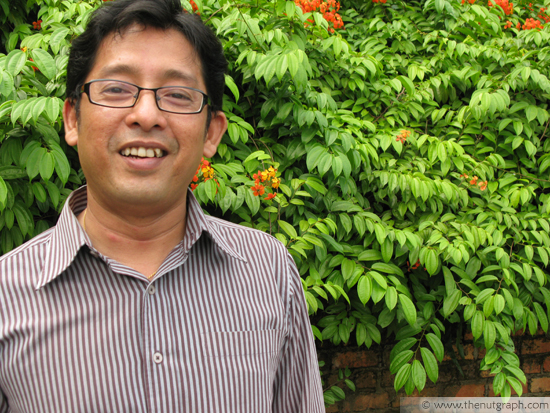
A Hindu by faith, Eddin studied Islamic thought and philosophy, which eventually led him to wonder about the PAS banning of wayang kulit in Kelantan at the start of the 1990s. That questioning led Khoo to work with expert and legendary traditional artists on the east coast. Through Pusaka, they work for the preservation and promotion of the ritualistic traditions of wayang kulit, Main Puteri, Mak Yong and others.
Eddin, who is also a poet, writer, translator and independent art curator, is widely published. Among others, Eddin has co-authored a book on traditional Malay wood carving, The Spirit of the Wood, as well as Sajak-Sajak, a Malay translation of poems by American poet Christopher Merrill. He collaborated with Ibrahim Hussein to complete the acclaimed Malaysian artist’s autobiography, titled Ib: A Life. Presently, Eddin is collaborating with Tun Salleh Abas, to complete the former Lord President’s memoir.
Eddin’s father, the historian Khoo Kay Kim, helped to write the Rukun Negara after the 13 May 1969 racial clashes. “I lived with a nationalist. I lived with a nation builder,” Eddin says of his father.
The historian Khoo would no doubt be proud of his firstborn son for carrying on the tradition of caring for the nation’s soul. Indeed, in recognition of his work in preserving an intrinsic part of Malay culture, Eddin was named one of Digi’s Amazing Malaysians in 2006. That same year, Singapore’s Channel News Asia named him one of its Asians of the Year.
Eddin speaks to The Nut Graph at his flat and study in Bangsar on 20 June 2011 about the importance of spirit and temperament in keeping the soul of a nation alive.
TNG: When and where were you born?
In Petaling Jaya (PJ), in Assunta Hospital. On 14 Oct 1969, five months and a day after the May 13 riots.
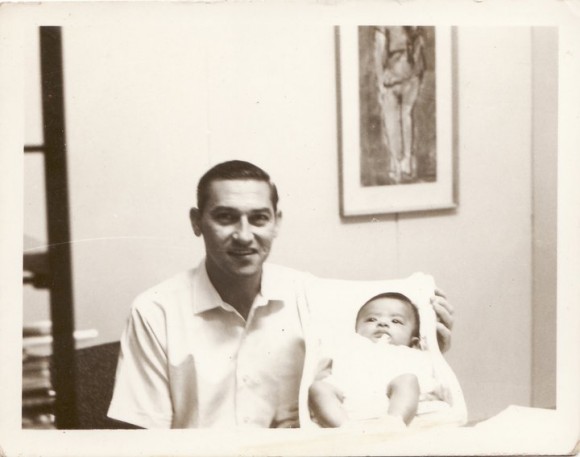
And where did you grow up?
I grew up right here in Bangsar. When I was born, my father was a tutor in UM (Universiti Malaya), finishing his Masters. We were given university flats in Section 16 in PJ.
And then we were given a small university house, which was always crowded because my father liked to have people stay. From there, we moved to Pantai Hills in 1971 or 1972 where we remained for almost 30 years.
Can you trace your ancestry?
My mother’s ancestry is very clear – to a village called Vattu Kotte in Jaffna in Sri Lanka.
My father’s ancestry must go back quite a while because they’re Baba. I place that ancestry in Penang. My great-grandfather Khoo Soo Cheow was the last person to register with the Khoo kongsi. Both my grandfather Khoo Soo Jin and my father didn’t register, but I registered.
So what generation Malaysian are you?
Let’s see. On my father’s side, it’s hard to tell actually. The last one I know is Khoo Soo Cheow.
Was he born in Penang, do you know?
No, I think he came to Penang from somewhere in south China. I’m not sure where my paternal grandmother’s ancestry comes from. I think [that ancestry in Malaysia] is older. They are very, very Baba actually. My father’s side is more ambiguous like most Babas.
My mother’s side is very clear. We are four generations. Because my great-grandfather, Sabapathi Pillai, came to work the railways… or was he a hospital assistant? One of those.
Did your dad grow up in Penang?
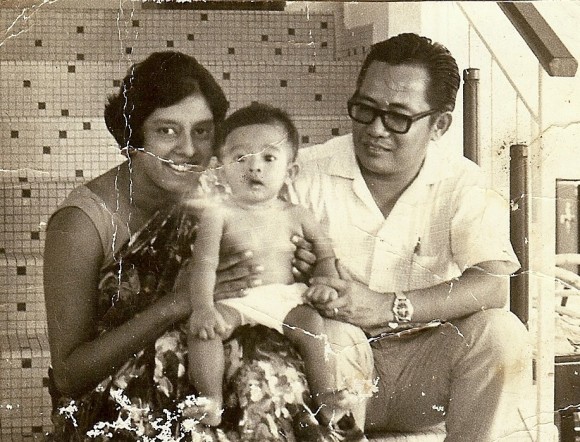
Both my parents are Perak people. My father was born in Kampar. My dad grew up in Ipoh because my grandfather was a civil servant, a chief clerk or what they called a CC. So, he moved around a great deal.
My mum was born in Tapah. And then I think they moved to Taiping. My grandfather on my mother’s side was itinerant because he was a hospital assistant. So my mum moved around a lot, but always in Perak.
My father is such an incredible cultural chameleon, right? And he fits into places like a lizard changes skin colour. He can be so incredibly Malay in a Malay setting. He can be so incredibly Indian in an Indian setting. The only setting he is not comfortable in is a Chinese setting (laughs). Very strange. Maybe that comes with being Baba, I’m not sure, because you’re kind of Chinese but not really, right?
What is your strongest memory of the place where you grew up?
[In Pantai Hills] (near Pantai Medical Centre), it was all jungle still – lots of green and wild animals. I used to catch tadpoles in a little river at the foot of our house.
My earliest memory is of being alone and being able to explore everything, everywhere.
And I have other memories, of course, of deep attachments to my mother, for one thing. To my grandmother. To my nanny. You know I had a Malay nanny, Rahmah? She raised me. She lived with us and was very much part of the family, and she left behind very indelible things in the way we behave.
Such as?
Not eating pork [at home] at all. Today, I don’t eat pork at all for religious pantang reasons. Not that I’m Muslim. I’m Hindu.
So, those kinds of cultural negotiations in the home, without ever having it being stated … you completely emphatise with someone else’s culture.
And then, of course, she left me my home name (chuckles), “Din”.
Did she have her own children?
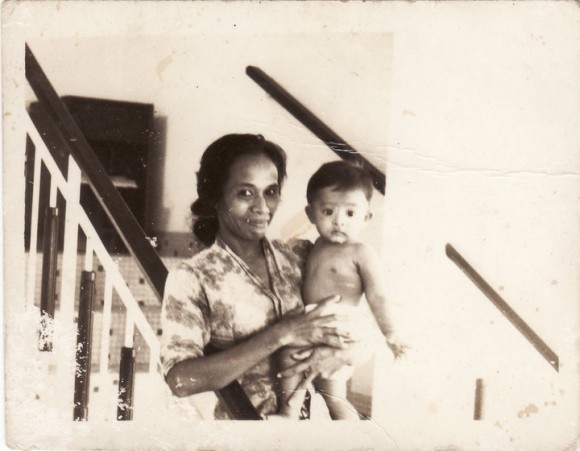
Yes, three. Idris, Jepun – we called him Jepun because he had slitty eyes – and Kak – I don’t know her actual name. And they lived with us!
Did you all speak Chinese growing up?
Nope. English at home and Malay because it was the national language and we had to know it, and then of course my nanny was there. I speak and understand Tamil fluently from my mum’s side.
But even my [paternal] grandparents hardly spoke Chinese. They spoke English.
So, these stories and memories you have, does that in any way inform your sense of identity as a Malaysian?
That’s another word I hate, by the way, “identity”. I think it’s very limiting to a person and it’s something that we all expect we must have. Whereas we are all cultural bastards. We are so incredibly polyglot. And yet what we are constantly seeking is to put ourselves nicely into one category or the other which really, to me, is a fallacy.
It was very difficult growing up as a multiracial child in a highly racialised society because you never fit in. And you are always the subject of taunt. The only people who didn’t taunt me were the Malay children, so all my friends were Malays.
Why do you think that was,?
Because I think Malay culture is – this is pre-1981, -1982, when changes were happening but they were not yet so apparent – so naturally cosmopolitan that I think Malays [have an instinctive] openness and acceptance. It’s very easy, for example, especially in those days, for Malay families to adopt non-Malays.
So, ya, I always found the Malays my natural community. Then of course there was my nanny.
A lot of that changed. I remember one time when we had this end-of-year class party, and I always used to bring chicken curry cooked by my nanny. But for the very first time, when I was in Standard Six, I was reminded to make sure the chicken was halal. And it was troubling to me […]
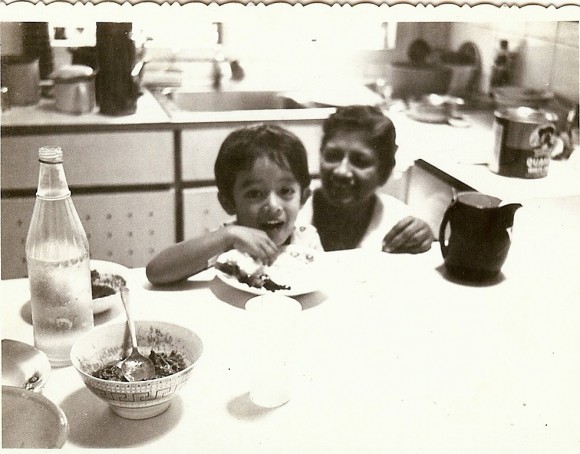
Also, I think the idea that it needed to be an instruction rather than something that you were able to understand and emphatise with. I mean, you guys were already doing it at home.
Ya, exactly. But you know, those are the problems of nationhood lah. Because we didn’t arrive at nationhood at 1957, you see. We didn’t arrive at nationhood in 1969. We arrived at nationhood throughout the 1970s, when suddenly the system had to permeate everything. Everything had to be centralised. It never used to be that way, I’m sure. Politics is a fiendish thing.
I know you hate the word “identity”, but are there any aspects of your identity that you struggle with?
My identity as a Malaysian that I most struggle with is the fact that I am more Malaysian than anybody else. I encapsulate everything this nation should be. My parents literally and biologically came together in the ways that this nation always has done. Yet, for lots of people, we are the eccentricity.
If people like us are the ideal, then why are we always kind of perceived as not the mainstream? Because we’re not pure this and pure that.
You’re a Hindu of mixed Chinese-Sri Lankan parentage. You’ve dedicated your life towards the protection and promotion of Malay culture through Pusaka, and before this through your writings. How did you become attracted to this as your life’s work? And why do you think it’s important?
I got into it by accident. I joined The Star in 1992 as a cultural journalist. My assignments were to cover and review arts events in the Kuala Lumpur area. But I got very bored by the kinds of expressions I was finding here.
And then I came across what was happening in Kelantan. Proscription lah, banning lah – things of this kind. It started in 1991.
My first degree was Islamic thought and philosophy, [which provided] a strong foundation of my knowledge. But what I found incredible was, the way Islam was developing, what I had learnt I never saw practised anywhere (chuckles). And certainly, it was not practised in Malaysia.
One of my main interests about Islam was to look at the particular experience of the Malays with Islam. Mysticism, Sufism, and the history of the Malays in Islam. And then all of sudden, the essence of the Malay experience of Islam was deemed haram! And you began to see the development of a very Salafi Wahabi kind of attitude taking over. Very un-Southeast Asian in nature.
By the time it began to affect traditions such as wayang kulit and Mak Yong, which had very strong foundations, not just in performance but in ritual, by which people kept alive their belief systems – I found that such thinking was a desecration.
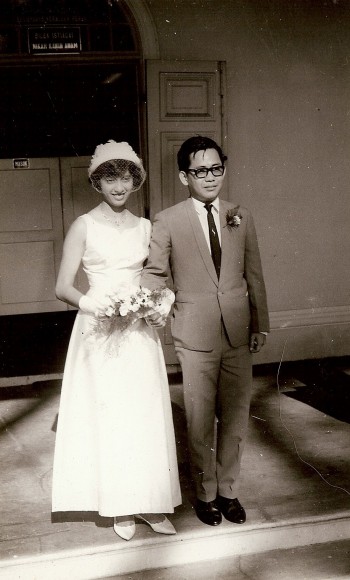
So I went to Kelantan to do some reporting. I was interested in puppetry, and then I met the puppeteer, Abdullah Ibrahim. That man was so infectious that I ended up spending the next 15 years of my life with him until he died. And now I carry on the work.
I never had any intention of setting up an organisation because I’m so disorganised, but it was a very strong wish for him that the work be formalised and organised. And we’re celebrating 10 years of the founding of the organisation next year.
Why is such work important? Because it is about spirit, semangat. I think the richness of this country is encapsulated in notions of spirit and temperament. It allows for all the kinds of possibilities that have happened in this place to continue to happen.
Maybe it’s very romantic of me. Nowhere in the world is it like this anymore. But I just felt that if you allow these things to die without putting up some kind of resistance, without allowing these stories to be told – both the stories about the life of these performers as well as what they represent – then you’re going to get one very insipid, spiritless society.
The measure of my work is not in Kuala Lumpur; [it] is in Kelantan. And today, is wayang dead? No, it’s more alive than ever. It’s so alive that actually these days if I want to organise a performance with the troupe I’ve worked 20 years with, I have to give three weeks’ notice! Because they’re playing every day.
In Kelantan itself, even though it’s been banned?
In Kelantan. The Kelantanese are amazing for their tenacity. And if they think your ban is just idiotic, they will literally continue to perform it to show you in your face that they think it’s stupid nonsense.
Of course, this is where Pusaka’s strategy was also helpful. While sustaining a localised form of performance, you spread the word out essentially to the whole world. So, performances have been staged in Paris, written about at length in Australia, covered in the international media.
And now, we have been able to elicit the interest, and been able to train an entire generation of young people from the age of eight to 16 from the kampungs who perform and have inherited the tradition.
Describe the kind of Malaysia you would like for yourself and future generations.
I would like a Malaysia where people are unafraid of their own complexity. That is my only wish actually. This quest for purity of race and religion is a great fallacy. And every religion will tell you that apocalypse occurs when attitudes become narrow and parochial.
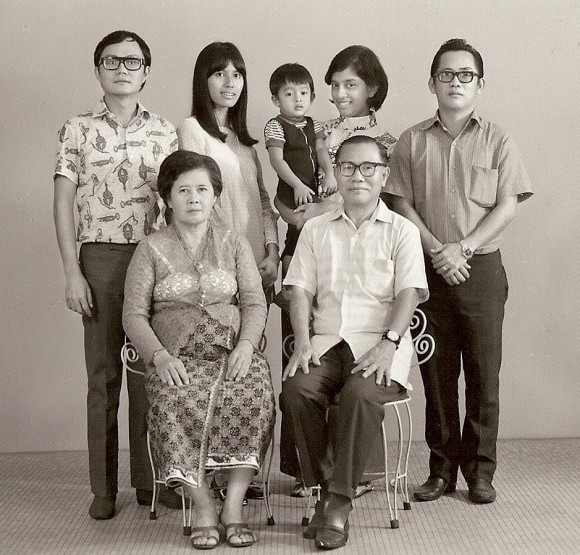
We know what it’s all about. It’s about power, no? Tribalism has no place in this country. It has never been our reality, ever. We’ve been a culture that has been very able to negotiate things without ever demanding one thing or another.
And I must say that a lot of that has changed because the essence of the culture of this place, which is essentially Malay culture, has changed. It’s very difficult to speak of a Malay culture as I know and understand it these days.
So would you say that the so-called Malay culture which exists today is a farce?
I have Malay students who don’t understand what being Malay means beyond the definition given to them by the constitution. It’s a political concoction, that’s what it is. A construct. It’s Umno culture lah, basically. ![]()
The book Found in Malaysia, featuring 50 of our best interviews plus four previously unpublished ones with Datuk Zaid Ibrahim, Tan Sri Rafidah Aziz, Datin Paduka Marina Mahathir and Ramli Ibrahim, is available at all good bookstores for RM45.


Ida Bakar says
It just shows that Malaysia means many things to different Malaysians – that is what makes us Malaysians!
If the interview is anything to go by, being Eddin Khoo is perhaps the best way to be a Malaysian. He is not confined by the religion and tradition of his ethnicity (whatever that means in Malaysia) but rather [is] enriched by them. He is free to be who he wants to be. If only the Malay leaders see Malay [Malaysians] with the same complexity as he does, instead of trying to herd us into an ethno-religious identity which is introverted, conformist and, of late, paranoid.
shu shi says
“My identity as a Malaysian that I most struggle with is the fact that I am more Malaysian than anybody else.”
Often, we want to stress that we are “more than” anybody or somebody else in something, but what’s the message behind?
JWhy says
“My identity as a Malaysian that I most struggle with is the fact that I am more Malaysian than anybody else. I encapsulate everything this nation should be.”
I sort of understand what he’s getting at, but this is also arrogant beyond belief. Thinking that one is “more” Malaysian than the rest probably isn’t conducive to national unity; this kind of “othering” underlies racial tensions!
Bad Rabbit says
I do like reading TNG, but I have to ask myself one simple question every time I do: Why are we more sensitive than shaved apes?
I mean really, what the heck is wrong with us?
Eddin Khoo is right: ethnically, combining Chinese and Malay, (Baba) and Tamil, how is he not the poster child for Malaysia? Apart from having directly worked to try and save a Malaysian art form. But he’s not saying that’s good, he’s saying in many ways it makes it worse for him that he is.
Everyone else goes off in a huff because he’s made a claim in your minds that he actually didn’t make. Take a chill pill, people.